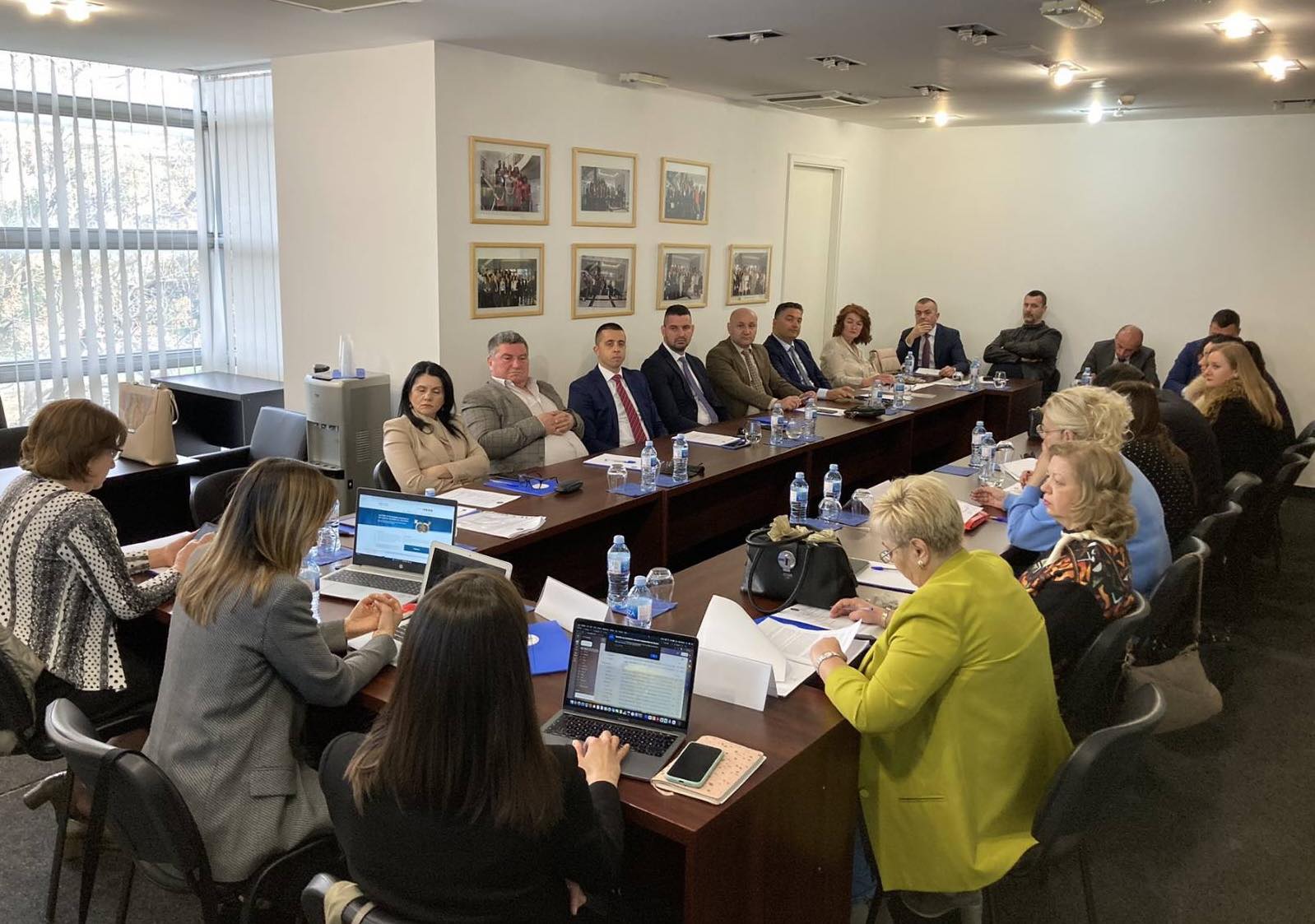Judges and prosecutors from Montenegro improve knowledge on domestic and gender-based violence
21 March 2023
On the 20th and 21st of March 2023, AIRE Centre and Centre for Education of Judges and Prosecutors in Montenegro, with support from the UK Government, held a training “Protection from Domestic Violence and Gender-Based Violence with an Emphasis on the Istanbul Convention” in Podgorica, that gathered 20 judges and prosecutors from all over Montenegro.

It took a long time for domestic violence not to be seen as a “family issue” and to begin to be treated as a problem of the social as a whole. States have the power to take adequate measures and steps that can ensure prevention, protection and deterrence concerning this violence. Several international conventions recognise domestic violence as a violation of human rights and a form of discrimination against women. This global and widespread issue mostly affects women, stemming from unequal power dynamics between women and men and gender inequality. However, it is important to note that men can also be subjected to domestic violence, which is a problem that is sometimes overlooked as these crimes are even less likely to be reported due to socially imposed stigma. Lastly, cases of domestic violence involving children are particularly difficult, and special attention is needed to ensure the right of the children to grow up in a healthy family environment. Family violence has incalculable consequences for the psychological development of children, both in the case when children are direct victims of violence and in the case when they witness violence.
According to the study conducted by the Organization for Security and Co-operation in Europe (OSCE) in 2018 in Montenegro, three out of ten women say they have experienced some form of physical violence, mostly during childhood or by their partner. One of this study’s most devastating findings was that only a small number of women reported the violence, even after the most severe incidents of physical and/or sexual violence. OSCE noted that this may be related to the belief, shared by two out of five women, that domestic violence is a “private matter” that should remain within the family.

Montenegro has ratified numerous international documents concerning combating violence against women, children, and domestic violence, most notably the Council of Europe’s Convention on Preventing and Combating Violence Against Women and Domestic Violence, better known as the Istanbul Convention.
“Montenegro is one of the first countries that signed and ratified the Istanbul Convention, so it is our obligation to ensure the Convention is effectively implemented. It is the first, most ambitious and most comprehensive legally binding international instrument in Europe in the field of preventing and combating violence against women and domestic violence. The Convention, among other things, reiterates the importance that member states provide training for competent experts on the prevention and detection of such violence, equality between women and men, needs and rights of victims, as well as the prevention of secondary victimisation of victims. The aim of this training is for judges and prosecutors to become more familiar with the Istanbul Convention, improve their knowledge, share experiences and best practices, as well as the challenges they face when it comes to their work concerning criminal offences covered by this Convention”, said Ljiljana Lakić, president of the Steering Committee of the Centre for education of judges and prosecutors in Montenegro.
“The AIRE Centre recognizes the importance of the fight against gender-based violence as well as the role that the judicial community plays in that process. During the three-year project that the AIRE Centre is implementing in the Western Balkans, we will work with judges and all other relevant actors toward our joint goal that justice is available to all victims of gender-based violence. In this process, we will have great support from the Gender Champions in the Judiciary Network, which the AIRE Centre recently established in cooperation with judicial training institutions. We consider the members of the network to be our champions who will advocate for changes when it comes to these problems, but also help us to understand the needs better and challenges the judges face during this process”, said Đina Popović, project manager of “Strengthening the rule of law, state institutions and respect for human rights in Montenegro” of AIRE Centre.
Greater knowledge and understanding of this issue is the first and also the most important step in the prevention and fight against gender-based violence. This is why the AIRE Centre developed an online course on the basics of gender equality. I use this opportunity to invite all members of the judicial community, as well as representatives of law enforcement institutions, social work centres, students, and the wider community, to take a course to familiarise themselves with the basics of gender equality. You can access the course on the edu.airewb.org website, anytime and anywhere”, added Popović.
As a part of this education, judges and prosecutors from Montenegro discussed the characteristics of domestic violence and gender-based violence, including its forms and dynamics with a special focus on the issue of children that are either direct victims of domestic violence or that have witnessed it. Furthermore, during this training, judges, prosecutors, and experts also discussed the prevalent problem of femicide in Montenegro. There is still far too little research being carried out on this problem, and in order to shed more light on this issue, in 2023, AIRE Centre and FemPlatz, jointly with partner organisations from Albania, Bosnia and Herzegovina, Montenegro, North Macedonia and Serbia, will be monitoring court proceedings in the cases of femicide, attempted femicide and other forms of gender-based violence against women in Western Balkans. Indeed, non-governmental organisations working directly with victims can highlight the complexity of not only immediate but also long-lasting issues victims face because of the violence.
“We discussed prejudices about partner and family violence, mechanisms of domestic violence, the consequences of psychological violence on victims, characteristics of victims and perpetrators, the dynamics of domestic violence as well as the basic principles of organisations working with victims of violence, assessment of the victim’s level of vulnerability and the relationship between violence against women and abuse of children”, said Maja Raičević, educator and director of non-governmental organisation Centre for Women’s Rights in Montenegro.
International standards, as well as the latest development and findings coming from international institutions, were also discussed during this education event.
“Firstly, we discussed the issue of gender-based violence and its connection with discrimination and other forms of violence that are contrary to international human rights standards. This global problem was presented through reactions of the global and regional organisations as well as obligations stemming from conventions ratified by Montenegro. We have put special focus on obligations of Montenegro arising from the Istanbul Convention and discussed the principle of Due diligence, strategy, operational goals, protocol on cooperation, etc. Lastly, we analysed the main goals and findings of the First General Recommendations by GREVIO, an independent expert body responsible for monitoring the implementation of the Istanbul Convention, which refers to increasingly prevalent forms of digital gender-based violence, as well as provides recommendations related to the issue of sexism. We ended our discussion with the analysis of the most relevant decisions of the European Court of Human Rights, illustrating how they further affirm these standards”, said Vesna Ratković, professor at the Faculty of Law of the Mediterranean University and educator at this training.
“When it comes to domestic violence, during my career working as a prosecutor, I encountered various problems and legal dilemmas. The most common dilemmas were related to the legal qualification of reported acts of domestic violence, i.e., whether it is a criminal offence or a misdemeanour, because the legal framework in that part is unclear. The problems most often arise from inadequate application of protection measures, the exposure of the victim to secondary victimisation and failure to comply with the Istanbul Convention’s legal standards when dealing with domestic violence victims. I believe that it is my obligation to transfer my knowledge and experience when it comes to this subject to younger colleagues and thus contribute to a more efficient application of the Istanbul Convention”, said Ljiljana Klikovac, former state prosecutor in Montenegro.
Maja Živaljević, judge of the High Misdemeanour Court of Montenegro and educator of this training, pointed out that “family violence and violence against women has a negative impact on both the physical and mental health, development, dignity and identity of the victim”.
“In most cases, women are victims of some form of violence, be it physical, psychological, economic, sexual, or socio-cultural. This is a difficult and complex issue, and it is important to recognize it, as everyone deserves to live without fear and family violence. The application of both national and international instruments and our collective response through the application of legal provisions, reporting of violence and prosecutions has the power of suppressing domestic violence as well as protecting basic human rights of victims”, said Judge Živaljević.
In 2019, AIRE Centre and the Supreme Court of Montenegro, with the support from the UK Government, published a handbook “Family violence: Overview of international standards and jurisprudence of the European Court of Human Rights”. This document aims to empower those who fight against family and gender-based violence. This handbook provides an overview of the obligations of Montenegro to respond to domestic violence, stemming from research conducted by international and domestic experts, and it covers several important issues arising both from domestic legal instruments and from the jurisprudence of the European Court of Human Rights. For more information, visit Gender Champions in the Judiciary Network.